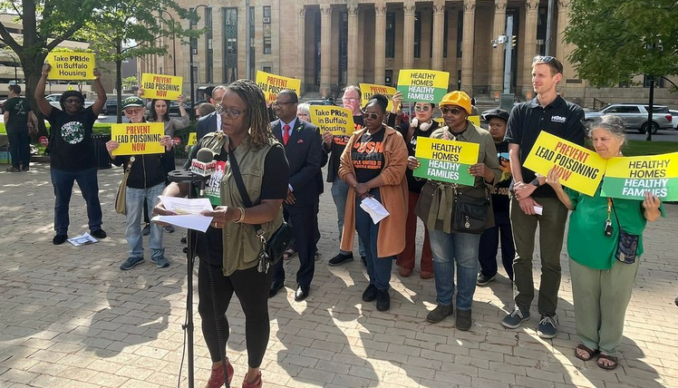

Buffalo, New York, housing advocates demonstrate, May 15, 2024.
Buffalo, New York
Activists and community members in Buffalo, New York, gathered at City Hall on May 15 to voice concerns and raise demands during the Common Council’s hearing on Mayor Byron Brown’s proposed annual budget. Chief among their concerns was the Department of Permits and Inspection Services Program, Proactive Rental Inspection (PRI), whose stated goal is to ameliorate health and safety issues in rental units in one and two family buildings.


Buffalo, New York, housing advocates demonstrate, May 15, 2024.
However, since the program’s implementation three years ago, only about 13% of the units in its scope have been inspected, and the program has relied on landlords to essentially volunteer for inspections by responding to a letter from DPIS. This lack of proactivity is due in large part to the fact that PRI has just two inspectors to cover approximately 36,000 apartments.
The proposed 2024-2025 budget includes funding for PRI drawn from increased rental registration fees. A coalition of organizations, including People United for Sustainable Housing, Housing Opportunities Made Equal and Our City Action Buffalo, have used this gesture as a stepping stone to demand the city do more to make the program effective. Coalition demands include clear goals for the program: hiring new inspectors and carrying out inspections, quarterly reports on progress toward these goals, mandatory health worker training for inspectors and preferential hiring of city residents to inspector positions.
Buffalo is one of the poorest cities in the U.S., and rapidly rising rents force people to take whatever housing they can get — often that means lead-contaminated, mold and pest-infested, poorly insulated and crumbling apartments. As one community member who spoke at the hearing noted, because of lead paint in homes, children in Buffalo are exposed to even more lead than those in Flint, Michigan, were.
Employees of Buffalo Public Schools and Jericho Road, a non-profit community health center that serves primarily poor people and refugees, drew the link between lead-induced developmental disorders and the school-to-prison pipeline that so many impoverished youths in Buffalo are subjected to.
The Hostel Buffalo-Niagara, which rents a city-owned property downtown and has provided interim housing for refugees and space for community events and art and brings in about $2.3 million in annual revenue to the city, was recently condemned due to faulty wiring on the building at the rear of the property. The Hostel does not occupy the rear and has offered to stabilize the building for the city on several occasions.
Money spent on cops, not human services
Other concerns raised at the hearing included a lack of funding for social services and community resources. The Buffalo Public Schools system has had its annual funding increased by only $500,000 in the last 15 years and its administrators are planning to lay off 30 teachers and leave positions made open by retirements vacant in order to make up an $80 million budget shortfall this year.
The city’s failure to fluoridate its water supply in over a decade is causing an uptick in tooth decay among Buffalo’s children, half of whom live in poverty. Store closures on the city’s East Side are making it harder for residents to find basic necessities in what is already a food desert. Community centers, parks, youth services and summer employment programs are severely underfunded.
Many of those who spoke at the hearing contrasted these profound wants with the mayor’s proposed budget increase of $95 million for the Buffalo Police Department, the largest in a decade. Despite its continually rising budget, BPD has failed to bring closure rates for rape and murder cases above 33%. As one community member pointed out, the police budget increase should probably include the $43 million settlement paid out last year to Chelsea Ellis, paralyzed from the neck down after being run down by a Buffalo cop.
The city also plans on a 9% property tax hike, which speakers at the hearing said would have the hardest impact on working-class homeowners and tenants, whose landlords would raise rent to offset the cost. Meanwhile, the city readily forgoes $64 million in potential annual tax revenue through its application of New York State real property law 485-a, which allows real estate developers to pay no taxes for eight years on properties being converted from non-residential to mixed-residential commercial usage. These developers pay lower rates for another four years.
The city is littered with empty storefronts being used to take advantage of this exemption. Developers apply for a building permit, mothball the building for a decade, then they get out of paying taxes and get away with gouging on rent prices by keeping housing stock artificially low. Mayor Brown’s budgets over the 18 1/2 years of his administration have made it no secret who his friends are, although their backroom dealings might be hidden from the public eye.
As part of Workers World newspaper’s coverage marking the 50th anniversary of the liberation of…
From the PFLP Central Media Office The following statement from the Popular Front for the…
Newark, New Jersey Over 250 people, representing over 250 New Jersey endorsing community groups, attended…
Special to Workers World The following is a press release issued on April 24, 2025,…
dear Larry Krasner, we heard you sued Elon Musk over his corrupt million election giveaways…
Unions join forces against harassment and deportation of members When 200 immigrant workers – from…